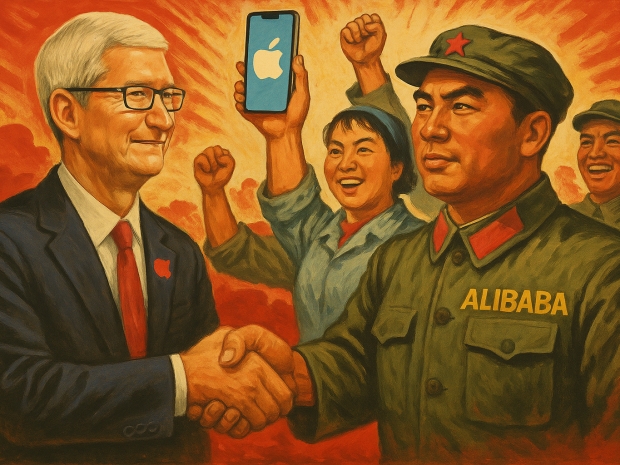Job’s Mob is desperate to partner with Chinese tech behemoth Alibaba to get its fancy AI features working in a market that hoovers up nearly a fifth of its total sales. But US politicians are throwing cold water on the deal, terrified that it could help China’s AI development and dump the outfit into Beijing’s murky legal swamp.
Three sources whispered to hacks that the White House and Congress have been grilling Apple about whether the Alibaba hookup could end up spreading censored Chinese chatbots and strengthening Alibaba’s AI prowess. They fear that iPhones in China could become a surveillance tool wearing Californian lipstick.
It’s not the first time Job’s Mob has been whacked by Washington’s red lines. In 2021, the company ditched a deal with YMTC, a Chinese memory chipmaker, after pressure from Uncle Sam. And now US tariffs on Chinese tat like iPhones are threatening to eat into the company’s fat margins.
But killing the Alibaba partnership could be a body blow. Chinese punters love AI gizmos, and without them, Apple’s handsets could look anaemic next to Huawei or Xiaomi’s offerings.
Apple execs have already been hauled into meetings with officials from the White House and the House Select Committee on China. The government asked bluntly about what data would be shared, whether Job’s Mob would sign up to Chinese regulations, and if any legally binding concessions were being made. According to the Indian Express Apple’s team fluffed most of their answers.
House Democrat and intelligence committee bigwig Raja Krishnamoorthi didn’t mince his words: “It is extremely disturbing that Apple has not been transparent about its agreement. Alibaba is a poster child for the Chinese Communist Party’s military-civil fusion strategy, and why Apple would choose to work with them on AI is anyone’s guess.”
He added that the partnership could let Alibaba hoover up data to improve its AI, all while Apple “turns a blind eye to the fundamental rights of its Chinese iPhone users.”
Alibaba chair Joe Tsai publicly confirmed the deal in February, so the cat’s clearly out of the bag.
The fear in Washington is that Apple might be setting a dangerous precedent, letting Chinese firms collect more data from iPhones and upgrade their models. These could then sneak their way into PLA hands.
The Trump Administration is toying with banning Alibaba and its ilk from any deals with US firms. Defence and intelligence honchos are digging into the company’s ties to the Chinese Communist Party and the People’s Liberation Army.
Greg Allen from the Wadhwani AI Center at CSIS slammed the idea of Apple helping its Chinese rivals: “The United States is in an AI race with China, and we just don’t want American companies helping Chinese companies run faster.”
Last year, Job’s Mob shouted loudly about its new AI tricks, dubbed Apple Intelligence. It shoved in message summarising, smarter email drafting and a reworked Siri that remembers things. It handed OpenAI’s ChatGPT the keys to the iPhone in the States.
But with ChatGPT banned from Beijing, Apple needed a local clone. After chatting with a few Chinese firms, it picked Alibaba and asked regulators to give the deal the nod.
That move triggered more alarm bells in Washington, with worries that Apple’s eagerness to please could lead to it signing away user rights or bending to dodgy laws. So far, there's been radio silence on when Chinese users will get these AI features. Cook only hinted that iPhones were doing better in markets where AI was live.
Richard Kramer, analyst at Arete Research, warned that scrapping the Alibaba pact could bite Apple. Alibaba isn’t just a tech firm, it’s also a mega e-commerce player that could help flog more iPhones. He noted Apple’s market share in China slid to 15 per cent in 2024 from 19 per cent in 2023.
Chinese users could still grab AI apps separately, Kramer added, but it would be fiddly and nowhere near as slick as rivals’ offerings.

